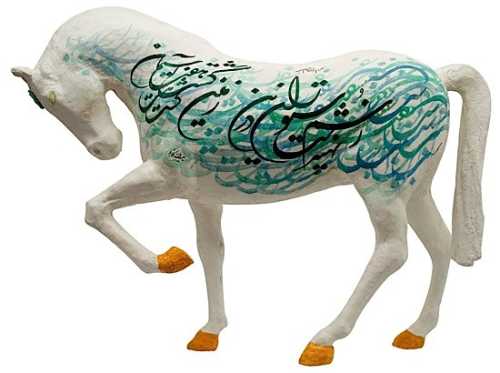About Yadollah Kaboli Khansari
Yadollah Kaboli, a contemporary Iranian cursive writer and calligrapher, was born in 1949 in Khansar, Isfahan and started his career in calligraphy in 1967.
Kaboli did not have any teacher in cursive, and he started to revive this script by transcribing the manuscripts in the museums and practicing the Qajar manuscripts. The peak of Kaboli's activity in this field happened in 1979 with the publication of the book "Shekasteh Khani and Shekasteh Nevisi", in which he examines the remaining works of such masters as Darvish Abdol Majid Taleghani, Mirza Koochak Esfahani, Mirza Gholamreza and Seyyed Golestaneh. After the publication of his first book and the beginning of cursive writing teaching in 1971, Kaboli has published 12 other books, including: "Samaa Qalam", "Kelk-eh Sheidaei", "Shekasteh Peyvasteh" and "Babatahir's couplets".
Yadollah Kaboli received the first master's certificate of cursive from the Iran Calligraphers Association in 1989, and since 1979 he has been a member of the artistic evaluation council of the professorial stage of the Iran Calligraphers Association and the Supreme Evaluation Council of the Ministry of Guidance and Cultural Heritage.
In 2006, this outstanding calligrapher was chosen as the lasting face of Iranian calligraphy.
Kaboli did not have any teacher in cursive, and he started to revive this script by transcribing the manuscripts in the museums and practicing the Qajar manuscripts. The peak of Kaboli's activity in this field happened in 1979 with the publication of the book "Shekasteh Khani and Shekasteh Nevisi", in which he examines the remaining works of such masters as Darvish Abdol Majid Taleghani, Mirza Koochak Esfahani, Mirza Gholamreza and Seyyed Golestaneh. After the publication of his first book and the beginning of cursive writing teaching in 1971, Kaboli has published 12 other books, including: "Samaa Qalam", "Kelk-eh Sheidaei", "Shekasteh Peyvasteh" and "Babatahir's couplets".
Yadollah Kaboli received the first master's certificate of cursive from the Iran Calligraphers Association in 1989, and since 1979 he has been a member of the artistic evaluation council of the professorial stage of the Iran Calligraphers Association and the Supreme Evaluation Council of the Ministry of Guidance and Cultural Heritage.
In 2006, this outstanding calligrapher was chosen as the lasting face of Iranian calligraphy.
The Most Expensive Artwork
At Auctions
First Attendance
24 October 2009
# Attendance
4
# Artworks
4
Average Realized Price
4,119 USD
Average Min Estimate
3,339 USD
Average Max Estimate
4,792 USD
Sell-through Rate
100%
Average Growth of Artwork Worth
7.933%
Timeline
The 22nd Tehran - Modern, Classic and Traditional Iranian Art auction
14 February
FINE FOLK OUTSIDER auction
18 November
100 Works, 100 Artists Online Exhibition exhibition
2 August
Manifestation Frame exhibition
28 September
Typography, solo exhibition exhibition
24 November
United Nations World Food Programme - Charity auction
30 April
Art Moderne et Contemporain Iranien et Arabe auction
24 October
